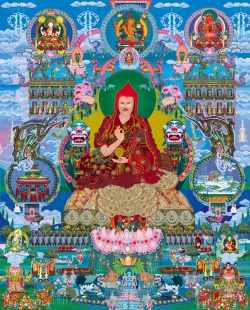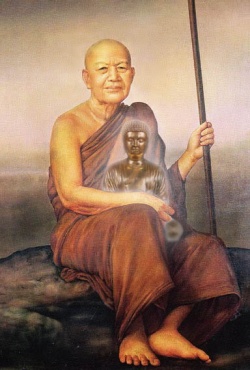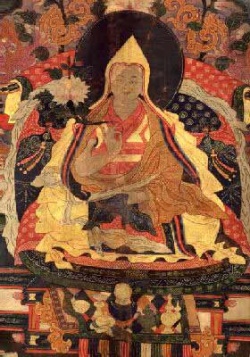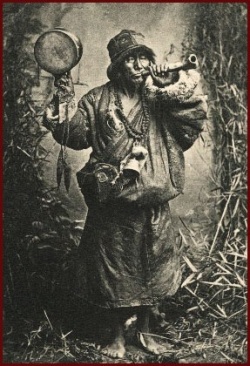Secret Oral Teaching in Tibetan Buddhist Sects
Following Alexandra David Neel in Tibetan Oral Teachings the Tibetan Masters defined three main groups of people from their thinking capabilities: “In general,” continued the Master, “we distinguish three kinds of individuals: those whose intelligence is completely dull : those whose intelligence is of average quality, able to understand some Truths which are specially evident; those endowed with an intelligence better equipped for acute perceptions, who are fit to penetrate below the surface of the world of physical phenomena and grasp the eauses which are at work there.’
The last group is not bound by opinions, their mind is free to work with ideas presented to them:
“It is enough to direct the attention to these last, to say to them: ‘Look from this point of view, consider that’ and they perceive what is to be perceived there where they have been told to look; they understand what is really the thing which one has pointed out to them.
The dull will not be able to fathom the secret ideas:
“One may proclaim on the high road the Teachings considered secret, they will remain ‘secret’ for the individuals with dull minds who will hear what is said to them, and will grasp nothing of it but the sound.
“It is not on the Master that the ‘secret’ depends but on the hearer. A Master ean only be he who opens the door: it is for the disciple to be capable of seeing what lies beyond. Teachers exist who are able to discern the degree of intellectual acuteness of those who desire their Teaching, and they reserve the detailed explanation of certain doctrines for those whom they judge able to understand them. It is thus that the deep Teachings, transmitted orally from Master to disciple for many generations, have been passed on and preserved from oblivion. You have heard them. Do with them as you think fit. They are very simple, but, like a powerful battering ram, they run counter to the wall of false ideas rooted in the mind of man and the emotions which delight him casting him into suffering ….. Try!”
Those in between will create beliefs, opinions, out of what they hear, but will not understand the depth of what they hear.
Transcendent Insight
Above the three categories we have a fourth, transcendent insight (lhag thong):
The Tibetan Masters who pass on the traditional oral teachings repeat insistently the fact that these teachings are for the use of individuals in the rab category, that is to say endowed with superior and excellent intelligence, the “lotus whose flowers grow above the level of the water” according to the picturesque comparison quoted above.
The object of these teachings is not to amuse the simple-minded, those charitably called in the Tibetan Scriptures the “children”, it is meant for the strong to make them stronger, for the intelligent to make them more intelligent, for the shrewd to develop their shrewdness and to lead them to the possession of transcendent insight (lhag thong) which constitutes the real enlightenment.
This oral tradition stems from a brilliant period of Buddhist philosophy, being handed down from master to disciple. They are not the result of supernatural revelation alone, but are the result of intellectual and spiritual investigations by men who also investigated the material plane, who possessed superior faculties of understanding, transcendent insight: lhag thong.
Transcendent Insight was the goal of the oral teachings:
The attainment of transcendent insight is the real object of the training advocated in the traditional Oral Teachings, which do not consist, as so many imagine, in teaching certain things to the pupil, in revealing to him certain secrets, but rather in showing him the means to learn them and discover them for himself.
What we learn from each other is of no value, only what we ourselves understand trough our own investigations becomes wisdom. Thats what separate the second group from the third, the second group eats books and save their content as abstract thoughts in their memory, where the third group transforms it to wisdom.
Lhag thong means to look through the curtain, through the illusion:
Literally, lhag thong, means to see “more”, to see “beyond”, to see “extremely”, “supremely”. Thus, not only to see more than that which is seen by the mass of mankind who are crassly ignorant, but to see beyond the bounds limiting the vision of cultivated minds, to bring into being the third eye of Knowledge which the adepts of tantric sects place in the centre of the forehead of their symbolic Gods.
The primary advice Buddha gave his disciples was: Doubt. It leads to research and research leads to knowledge.
those who follows the path has to take all the things up they take for granted, to understand it fully instead of abstract knowledge we have learned up through life.
“Now investigate whether these facts which you accept as representing a reality are, truly, real. Examine them attentively and at length, putting aside all preconceived ideas, empty your mind of all the opinions which it has harboured concerning these facts; doubt that which you have mechanically admitted up to the present, look as you would look at quite new things, those which form your physical environment; you will then investigate the mental reactions to which they give rise.
Where have we received our current knowledge, from our senses:
We have s en, heard, tasted, smelt, touched various objects, either material or of a more tenuous nature. We have given names to these various objects, we have classified them in series of similar objects, we have built up, with them, a world which has become familiar to us in the same way as we furnish a house in which we live.
This is the illusion we live in. As children we have build our first illusions, the first rules we live by, we are not old enough to understand, so we create rules to live by, which we can change when we become older, but often we don’t, and these rules or packets of experiences are our karma and they can be sore to touch, but we have to open them to be free, and when we do, it only contains a childs fears, not a problem for a grown up.



